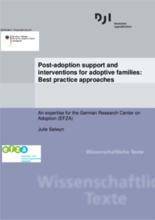Introduction
This rapid literature review was commissioned by the German Research Centre on Adoption (EFZA) located at the German Youth Institute in Munich (Germany). The overall aim of the review was to consider the support needs of domestic and intercountry adoptive families and the evidence for effective interventions. Step-parent, relative and domestic private adoptions were excluded. The review focused on three key questions:
a. What are the kinds of services that adoptive parents and children require?
b. What is known from the literature on adoptive families' use of services and the barriers and enablers to access?
c. What is known from the existing literature about the effectiveness of interventions, which support domestic and inter-country adoptive families?
A database search was undertaken of Social Care Online, Zetoc, and Web of Science. Only publications in the English language were selected and searches were limited to literature published since 2000. In addition, a wider literature was examined on interventions for maltreated and traumatised children, as the majority of adopted children have been abused and/or neglected. Three reviews of the literature on adoption support were also drawn upon: Livingstone-Smith, S. (2010) Keeping the Promise, Evan B. Donaldson Institute; Livingstone- Smith S. (2014) Facilitating adoptions from care. London BAAF and Stock et al., (2016) Independent Evidence Review of Post-Adoption support interventions, London, Department for Education.
There are also numerous US databases that evaluate interventions, mental health treatments and promising practices, which were relevant for this review e.g. www.effectivechildtherapy.org; www.nctsn.org/resources/audiences/ parents-caregivers/treatments-that-work and www.cebc4cw.org/. Specialist 'evidence-based' online registries and databases were trawled including the US Children's Bureau and Child Welfare Information Gateway. One of the most useful resources was the catalogue produced by the US based National Quality Improvement Center for Adoption and Guardianship Support and Preservation (QIC-AG http://qic-ag.org/). The catalogue itself is not an evidence based review system but collates the evidence from 15 US evidence based review systems on interventions that have either been:
a. Designed specifically for families and children with plans for a permanent placement or those who need support post placement i.e. pre and post placement services
b. Interventions that are well supported by evidence of effectiveness on other populations but might need adapting for adopted children and families

